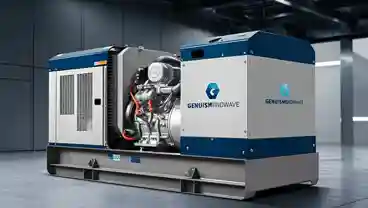Diesel Generator backup solution is the key to ensuring reliable power during outages.
How does the frequency decrease by increasing the load? and how is it controlled? How is it maintained? What are the main parts we are using? How do they work together to produce electricity?
How does the alternator used in DG work? Along with it how does the diesel engine work? Which is giving the mechanical input to the work of the alternator?
We will try to understand it in a very good way. If you want to know all these things then read this article till the end. You are going to learn a lot, so first of all, let’s give a basic idea.
What are Diesel Generators?
Diesel generators convert the diesel fuel they put into them into electrical energy and then this electricity is used in areas where there is a power outage.
These generators work as a backup or primary power source. These generators are very reliable in terms of their strength and durability. Other generators cannot handle such a heavy load, while this generator can work for a long time.
How Diesel Generators Work
Step 1
How does a diesel generator work and what parts are installed in it? It has two things, one is a diesel engine and the other is an alternator.
This alternator generates electricity. When the rotor of this alternator is rotated, it becomes able to generate electricity due to magnetic induction.
This rotating work is done by the diesel engine, so the rotor shaft is mechanically connected to this diesel engine. When the diesel engine rotates, it also rotates the rotor.
A diesel engine is also called an internal combustion engine. Inside it, you will find many cylinders.
Inside these cylinders, there is a piston, so when this piston moves up and down inside the cylinder, it rotates the crankshaft, the same shaft to which you have connected the mechanism.
Step 2
A diesel generator compresses and heats the air in its combustion chamber. This hot air, when mixed with diesel, ignites, creating energy that drives the piston, which in turn creates mechanical energy.
An alternator uses this mechanical energy to generate electrical energy, which is later used by electrical machinery equipment in various buildings during power outages.
Step 3
As the air is compressed, the temperature and pressure of this air increase greatly. Eventually, the hot air in the cylinder runs out, so during these four stops, the crankshaft rotates completely twice, and because of this, the alternator shaft of the alternator is now used.
There are multiple diesel generators, one is your main and one is the alternator with the help of which you are generating electricity.
Advantages of Diesel Generators
Diesel generators are more advantageous than other generators because they use less fuel and can produce electricity for a longer period, which saves costs and also saves the budget due to less maintenance.
Learn More
What Are Diesel Generators Used For?
Diesel generators ensure the flow of power during outages. They are also used to run medical equipment in hospitals. They also work in remote areas where electricity is not available. Construction sites use them because when grid power is not available, the diesel generator eliminates the outage.
Farmers also use them in irrigation systems. On the other hand, diesel generators play an important role in ensuring the uninterrupted supply of electricity in various sectors.
.
Types of Diesel Generators
Portable Diesel Generators
Portable diesel generators are light and small, making them easy to move from one location to another. They are designed to generate power on a small scale, such as camping, outdoor events, or temporary job sites.
Stationary Diesel Generators
Stationary diesel generators are fixed in one location. They are installed in hospitals and other institutions to provide a continuous supply of electricity or as a backup power source.
Industrial Diesel Generators
These generators are used for heavy duty hence they are made for large machinery factories and construction sites. They are highly durable and ideal for continuous power supply.
Marine Diesel Generators
Mehreen diesel generators are specially designed for marine and boat engines. These generators are designed to withstand harsh marine environments and provide reliable power supply to navigation systems and ship equipment.
Mobile Diesel Generators
Mobile diesel generators are installed in large vehicles and trailers. They can move from one place to another, so they are used to provide power to remote locations during emergencies or natural disasters.
Open Diesel Generators
These generators have an open structure, meaning that all their parts are visible, so they are not noisy and are less protected from weather conditions.
Enclosed Diesel Generators
These generators are packaged in a soundproof casing. These generators work without making noise, which is why they are ideal for places where noise should not be present, such as hospitals, and residential areas.
Which Petrol Is Best For The Generator?
Diesel generators do not run on gasoline, but if you want to use these generators on gasoline, then high-quality fuel is the best choice.
It helps the engine run smoothly and reduces carbon production. Moreover, unleaded gasoline with ethanol content prevents damage to engine parts.
Many manufacturers recommend using fresh fuel because it maintains its performance. Furthermore, regular maintenance and use of good fuel and proper storage of fuel in the generator extend its life, so choosing the right fuel ensures better performance.
Key Benefits of Diesel Generators for Reliable and Efficient Power Solutions
- Durability in Extreme Conditions
- High Efficiency and Fuel Economy
- Low Maintenance Requirements
- Scalability and Customization
- Enhanced Safety Features
- Proven Track Record
- Longevity
- Cost-Effective
- Reliable Performance
- Versatility
- Safety
- Environmental Impact
How long do diesel generators last?
Diesel generators, if properly maintained, last a long time. Usually, if they are run for 10 to 30 hours, they continue to run smoothly.
Taking care of their regular maintenance and cleaning will increase their lifespan. For example, changing the oil periodically, cleaning the filter, and checking the fuel system helps prevent much damage.
Diesel generators are more durable than gas generators due to their powerful engine. If they are used for standby power, they last for many years, but if they are used continuously, their efficiency may decrease. Therefore, proper servicing and controlled use keep diesel generators running for a long time and efficiently.
Are diesel generators better than gas?
| Feature | Diesel Generators | Gas Generators |
|---|---|---|
| Fuel Efficiency | Provides more power by using less fuel. | Provides less power by using more fuel. |
| strength | These last longer and require less maintenance | They require more maintenance over time |
| Performance | They work better because they are heavier | They need more diesel to perform well. |
| Discharged | Diesel generators discharge more pollution | gas generators produce less. |
| Level of Noise | Its engine is heavy, which is why it produces loud noise | A gas generator does not produce much noise. |
| Cost | Purchasing a diesel generator is expensive | purchasing a gas generator is cheaper. |
| Fuel Availability | Diesel is easily available everywhere | gas is not easily available everywhere. |
Conclusion
Having a diesel generator as a backup source of electricity provides peace of mind in the event of an unexpected power outage. Diesel generators do not cause any problems in our daily activities as they require less maintenance and also require fuel.
This is why many business people, large agencies, and household appliances rely on diesel generators to run continuously.
This generator is a great choice for backup power. Hopefully, after reading this article, you will also understand why diesel generators are our first choice.



